Dermatologists in this blog post believe that exfoliating the scalp is important for keeping it healthy and encouraging healthier hair development.
The Science of Scalp Exfoliation: Understanding the Basics
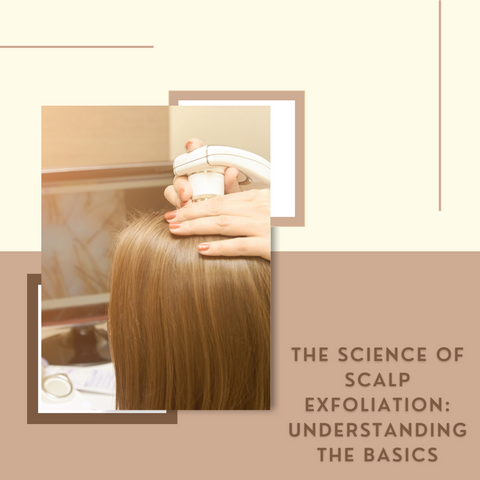
Exfoliating the scalp includes removing debris, extra oil, and dead skin cells from its surface. Encouraging good hair development and preserving a healthy scalp environment can both benefit from this approach. It is important to employ mild procedures and products made especially for exfoliating the scalp. Using treatments not meant for the scalp or exfoliating it too rough might cause damage, inflammation, or dryness. Scalp exfoliation is often achieved with natural exfoliants like sugar, salt, fruit enzymes, or specially-made scrubs. These ingredients aid in releasing and eliminating accumulation and dead skin cells without endangering the scalp. Recall that every person has a different need for how often to exfoliate their scalp. Considerations should be made for elements like sensitivity, scalp health, and kind of hair. Moderation is crucial when exfoliating the scalp since overdoing it can deplete it of its natural oils and cause dryness or irritation.
Why Exfoliating Your Scalp Matters: Health and Hair Benefits
Because exfoliation has a good effect on both scalp health and hair growth, it has several health and hair benefits. The benefits of scalp exfoliation include removing dead skin cells, improving product absorption, promoting general scalp health, stimulating circulation, preventing follicle blockage, balancing oil production, and enhancing hair health. Before beginning a scalp exfoliation regimen, speak with a dermatologist or other hair care specialist if you have any concerns or conditions related to your scalp. To get the most out of the regimen without hurting your scalp, it is important to customise it to your unique needs.
Choosing the Right Exfoliation Method for Your Scalp Type
It's important to choose the right exfoliation technique for your type of scalp to get a thorough cleaning without irritating or harming it. These are specific recommendations for several types of scalps, including normal, oily, dry, sensitive, and buildup-prone. Keep in mind that these broad recommendations may need to be adjusted depending on specific scalp sensitivities or reactions. They are not definite. When experimenting with new products, always do a patch test and modify the frequency and application technique according to your scalp's reaction. Before beginning an exfoliation regimen, see a dermatologist or other healthcare provider if you have any underlying scalp issues to prevent aggravating the condition.
Home Remedies vs. Professional Treatments: What’s Best for Your Scalp?
The health of your scalp, your preferences, and the outcomes you hope to attain will determine whether you choose home remedies or professional treatments. At-home fixes for small problems or upkeep may be sufficient. To ensure accurate diagnosis, successful treatment, and long-term scalp health, it is frequently advised to seek professional advice and treatments for severe or persistent scalp disorders. The best course of action for your scalp issues may be determined by speaking with a trichologist or dermatologist.
Step-by-Step Guide: How to Exfoliate Your Scalp Effectively
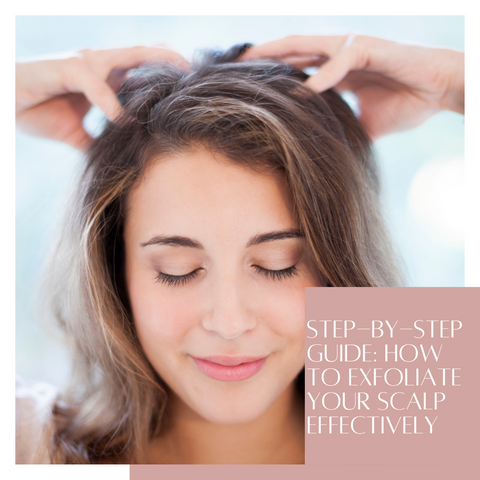
Exfoliating your scalp properly entails a step-by-step procedure that ensures thorough cleansing without causing irritation or damage. Here's a step-by-step guide to properly exfoliating your scalp:
-
Step 1: Choose the Right Exfoliating Product: Choose a scalp exfoliating product that is gentle on the skin. Look for exfoliating shampoos, scrubs, and treatments that contain natural exfoliants such as sugar, salt, fruit enzymes, or mild acids.
-
Step 2: Wet Your Hair: Begin by thoroughly wetting your hair with lukewarm water. Before applying the exfoliating product, make sure your scalp and hair are completely saturated.
-
Step 3: Apply the Exfoliating Product: Take a small amount of the exfoliating product and apply it directly to your scalp. Section your hair to ensure even distribution of the product across the entire scalp.
-
Step 4: Massage Gently: Using your fingertips (not your nails), gently massage the exfoliating product into your scalp using circular motions. Focus on areas where buildup or flakiness is more prominent.Massage the area for 3-5 minutes to increase blood circulation and loosen dead skin cells and buildup..
-
Step 5: Thoroughly Rinse: To remove all traces of the exfoliating product, thoroughly rinse your scalp and hair with lukewarm water. Make sure there is no residue left, as leftover product can irritate the scalp.
-
Step 6: Finish with Shampoo and Conditioner: After exfoliating, cleanse your hair and scalp with a mild shampoo. Gently massage the shampoo into your skin and thoroughly rinse. Follow up with a conditioner to hydrate and nourish your hair and scalp.
-
Step 7: Towel Dry and Style: Gently pat your hair with a towel to remove excess water. Avoid rubbing vigorously, as this can cause friction and potential damage. Proceed with your usual styling routine.
Following these steps and keeping your scalp's sensitivity in mind will help you exfoliate your scalp effectively, promoting a healthy environment for hair growth and overall scalp health.
DIY Scalp Scrubs: Natural Ingredients for Healthy Hair
Creating your own DIY scalp scrubs using natural ingredients can be an excellent way to promote a healthy scalp and encourage vibrant hair growth. Here are some natural ingredients that can be used in DIY scalp scrubs:
-
Brown Sugar or White Sugar: Sugar crystals are gentle exfoliants that help remove dead skin cells and impurities from the scalp without being too abrasive. They also dissolve easily in water, making rinsing easier.
-
Sea Salt or Himalayan Pink Salt: Salt granules can effectively exfoliate the scalp, removing buildup and promoting blood circulation. However, they can be more abrasive, so use them cautiously, especially if you have a sensitive scalp.
-
Oatmeal: Ground oatmeal can soothe the scalp while providing a gentle exfoliation. It's suitable for sensitive scalps and helps to alleviate itching or irritation.
-
Baking Soda: Baking soda can act as an exfoliant to remove dead skin cells and excess oil. However, it should be used sparingly as it can be drying, and its pH level is higher than that of the scalp.
-
Coconut Oil: Coconut oil can be used as a base or added to the scrub for its moisturizing properties. It helps hydrate the scalp and hair while providing a smooth texture to the scrub.
-
Olive Oil: Similar to coconut oil, olive oil is a good moisturizer. It also contains antioxidants and can help in conditioning the scalp and hair.
-
Essential Oils: Essential oils like tea tree oil (anti-inflammatory and antimicrobial), lavender oil (soothing), rosemary oil (stimulates circulation), or peppermint oil (refreshing) can be added for their beneficial properties. Remember to dilute essential oils properly to avoid irritation.
-
Aloe Vera Gel: Aloe vera has soothing properties and can help alleviate scalp irritation. It also moisturizes the scalp and promotes a healthy pH balance.
When making DIY scalp scrubs:
-
To create a paste-like consistency, combine selected exfoliants (sugar, salt, oatmeal, etc.) with a moisturising agent (coconut oil, olive oil, aloe vera gel) and a few drops of essential oils (optional).
-
Before applying the scrub to your entire scalp, perform a patch test to check for any adverse reactions.
-
Apply the scrub gently to your wet scalp, sectioning your hair to ensure even distribution. Gently massage the scrub onto your scalp in circular motions for a few minutes.
-
Thoroughly rinse your scalp and hair after massaging to remove all traces of the scrub. As usual, follow up with shampoo and conditioner.
Using DIY scalp scrubs once a week or every two weeks, depending on the needs of your scalp, can aid in the maintenance of a healthy scalp environment conducive to healthy hair growth. Depending on your scalp type and sensitivity, adjust the ingredients and frequency.
Navigating Through Scalp Exfoliation Products: What to Look for
When selecting scalp exfoliation products, look for specific features and ingredients to ensure effectiveness without causing irritation or damage. Here's what to consider when navigating through scalp exfoliation products:
-
Look for products containing gentle exfoliants suitable for the scalp. Sugar, salt, fruit enzymes, oatmeal, and mild acids such as salicylic acid or alpha hydroxy acids (AHAs) are examples of common natural exfoliants. These are gentle enough to remove dead skin cells and buildup without being too abrasive.
-
Choose products that contain natural ingredients that are gentle and nourishing to the scalp. Ingredients such as coconut oil, aloe vera, jojoba beads, or essential oils (such as tea tree oil or lavender oil) can provide additional benefits while exfoliating.
-
Avoid products that contain harsh chemicals, sulphates, parabens, or artificial fragrances, as these can irritate the scalp and strip away natural oils, resulting in dryness or sensitivity.
-
Choose products specifically formulated for the scalp. Scalp scrubs, exfoliating shampoos, or treatments designed to target scalp issues ensure they are pH-balanced and suitable for the scalp environment.
-
Look for exfoliation products that include moisturizing agents to prevent the scalp from drying out after exfoliation. Ingredients like glycerin, hyaluronic acid, or natural oils help maintain scalp hydration.
-
If you have scalp conditions like dandruff, psoriasis, or eczema, consider products containing ingredients with anti-inflammatory or antimicrobial properties like tea tree oil or aloe vera to soothe and calm the scalp.
-
Products recommended or approved by dermatologists or trichologists often undergo testing and are designed to address specific scalp concerns without causing harm.
-
If you have allergies or sensitive skin, carefully read the ingredient list to avoid allergens or irritants that could cause reactions.
-
Before using a new product, perform a patch test on a small area of your scalp to ensure there are no adverse reactions or sensitivities.
-
To ensure effective and safe exfoliation, carefully follow the product instructions regarding frequency, application, and rinsing.
Keep in mind that everyone's scalp is unique, so what works for one person may not work for another. It's essential to consider your scalp type, any specific concerns or conditions, and trial-and-error to find the right exfoliation product that suits your scalp's needs while providing effective cleansing and maintaining scalp health. Consulting a dermatologist or a hair care professional can also guide you in choosing the best scalp exfoliation product for you.
Frequent Exfoliation: Finding the Right Balance for Scalp Health
Finding the right balance for scalp exfoliation frequency is crucial for maintaining scalp health without causing irritation or overstimulation. Here are some guidelines to help determine the ideal frequency:
- Consider Your Scalp Type: Different scalp types require varying levels of exfoliation. Oily scalps might benefit from more frequent exfoliation (once a week), while sensitive or dry scalps may need it less often (once every two weeks or less).
-
Assess Scalp Condition: If you have scalp conditions like dandruff, psoriasis, or eczema, consult with a dermatologist for guidance on how often you should exfoliate. They might recommend specific products or a tailored exfoliation routine.
-
Monitor Scalp Response: Pay attention to how your scalp responds to exfoliation. If you notice any signs of irritation, redness, or increased sensitivity, you may be exfoliating too frequently or using products that are too harsh. In such cases, reduce the frequency or switch to milder exfoliants.
-
Adapt to Seasonal Changes: Consider adjusting your exfoliation routine based on seasonal changes. For instance, you might need more frequent exfoliation during hot and humid weather due to increased sweat and oil production, while in colder, drier months, less frequent exfoliation might be suitable to prevent excessive dryness.
-
Balance with Other Haircare Practices: Exfoliation is only one aspect of scalp care. Ensure a balanced hair care routine that includes proper cleansing, conditioning, and protection from environmental stressors to support overall scalp health.
-
Listen to Your Scalp: Ultimately, your scalp will provide cues about its needs. If it feels itchy, oily, or has visible flakiness, it might signal that exfoliation is needed. Conversely, if your scalp feels tender or overly sensitive after exfoliation, you might be doing it too frequently.
-
Trial and Observation: Experiment with different frequencies (e.g., exfoliating once a week, bi-weekly, or even monthly) and observe how your scalp responds. Finding the right balance might require some trial and error to determine what works best for you.
Addressing Scalp Concerns: Exfoliation for Dandruff and Itchiness
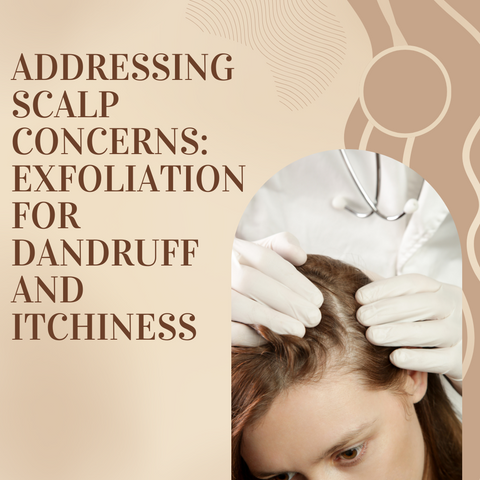
Exfoliation can be beneficial in treating scalp issues such as dandruff and itching. Here's how to approach exfoliation for these problems:
-
Dandruff: A fungus known as Malassezia, which causes scalp irritation and flaking, is often the cause of dandruff. Use an exfoliating scalp treatment or shampoo containing active ingredients such as salicylic acid, selenium sulphide, coal tar, or ketoconazole. These ingredients aid in the reduction of fungal growth and the removal of dead skin cells. Initially, use these products as directed (often a few times a week) to address dandruff. Once the condition improves, reduce usage to prevent over-drying or irritation.
-
Itchiness: Dryness, product accumulation, and underlying scalp disorders like psoriasis or eczema are some of the causes of itchiness. For dryness- or buildup-related itching, use light scrubs with natural exfoliants such as sugar, oatmeal, or jojoba beads. These aid in removing buildup and dead skin cells without aggravating the scalp further. Exfoliate your scalp once a week or every two weeks to keep it healthy and less irritated from dryness or slight accumulation.
General Tips for Exfoliating in the Case of Dandruff or Itchiness:
-
Be gentle when exfoliating to avoid aggravating the scalp. Massage the exfoliant in circular motions using your fingertips, not your nails.
-
Ensure thorough rinsing to remove all traces of the exfoliating product to prevent further irritation.
-
After exfoliating, use a soothing and hydrating scalp serum or conditioner containing ingredients like aloe vera, tea tree oil, or witch hazel to calm and nourish the scalp.
-
If dandruff or itchiness persists despite exfoliation or if you suspect an underlying scalp condition, seek advice from a dermatologist. They can provide a proper diagnosis and recommend targeted treatments or medicated solutions.
Exfoliation can help reduce dandruff and itching, but you should be aware of how sensitive your scalp is and modify the frequency and products you use. Over time, these issues can be greatly improved by taking consistent care of your scalp and utilising treatments that are appropriate for your kind and condition of scalp.
Natural Solutions for Dandruff Control through Exfoliation
Exfoliating the scalp with natural ingredients can help control dandruff by removing dead skin cells and reducing the buildup of flakes. Here are some natural solutions for dandruff control through exfoliation:
-
Tea Tree Oil: Mix a few drops of tea tree oil with a carrier oil (such as coconut or olive oil) and massage it into your scalp. Tea tree oil has antifungal properties that can help combat the fungus associated with dandruff.
-
Apple Cider Vinegar (ACV) Rinse: Dilute apple cider vinegar with water and use it as a final rinse after shampooing. ACV has antimicrobial properties and can help balance the pH of the scalp, reducing dandruff.
-
Baking Soda Scrub: Create a paste using baking soda and water, then gently massage it into your scalp. Baking soda has exfoliating properties that can help remove dead skin cells and balance oil production on the scalp.
-
Aloe Vera Gel: Apply fresh aloe vera gel directly to the scalp and massage it in. Aloe vera has soothing and moisturizing properties that can alleviate itchiness and reduce inflammation associated with dandruff.
-
Coconut Oil and Lemon Juice: Mix coconut oil with fresh lemon juice and apply it to the scalp. Coconut oil moisturizes the scalp, while lemon juice's acidic properties can help balance pH levels and combat dandruff-causing fungus.
-
Oatmeal Scrub: Blend oatmeal into a fine powder and mix it with a small amount of water or yogurt to create a gentle scrub. Apply it to your scalp and massage it in circular motions to exfoliate and soothe the scalp.
-
Epsom Salt Soak: Dissolve Epsom salt in warm water and use it as a scalp soak before shampooing. Epsom salt can help exfoliate the scalp and alleviate itching caused by dandruff.
-
Rosemary Essential Oil: Mix a few drops of rosemary essential oil with a carrier oil and massage it into your scalp. Rosemary oil has antimicrobial properties that may help control dandruff.
If dandruff persists or worsens despite using natural remedies, see a dermatologist for a proper diagnosis and personalised treatment plan.
Soothing Itchy Scalp: Gentle Exfoliation Techniques
Gentle exfoliation can help relieve itchy scalp by removing dead skin cells and reducing irritation. Here are some gentle exfoliation techniques for an itchy scalp:
-
Fingertip Massage: Gently massage your scalp in circular motions with your fingertips. This increases blood circulation and aids in the removal of dead skin cells without irritating.
-
Soft Brush or Scalp Massager: For gentle exfoliation, use a soft-bristled brush or a dedicated scalp massager. Circularly move the brush or massager across the scalp to remove flakes and improve circulation.
-
Oatmeal Paste: To make a gentle scrub, combine finely ground oatmeal with a little water. Apply this paste to your scalp, gently massage it in, and then thoroughly rinse.
-
Coconut Oil Massage: Massage a small amount of coconut oil into your scalp using circular motions. Coconut oil moisturizes the scalp and can help soothe itching while providing a gentle form of exfoliation.
-
Aloe Vera Gel Application: Apply fresh aloe vera gel directly to your scalp. Aloe vera has soothing properties that can help calm inflammation and relieve itching without irritating.
-
Diluted Apple Cider Vinegar Rinse: Mix apple cider vinegar with water (diluted in a 1:1 ratio) and use it as a final rinse after shampooing. Apple cider vinegar helps balance the scalp's pH and soothes itchiness.
-
Tree Oil Scalp Treatment: Mix a few drops of tea tree oil with a carrier oil (like olive or coconut oil) and massage it gently into your scalp. Tea tree oil has antimicrobial properties that can alleviate itchiness.
-
Warm Oil Compress: Warm a small amount of olive oil or coconut oil and apply it to your scalp. Cover your head with a warm, damp towel and leave it on for 15-20 minutes before shampooing.
Regular use of mild exfoliating methods can help control a rashy scalp by improving the surrounding environment and lowering inflammation. To find the underlying reason and get the right therapy, it's best to see a dermatologist if the itching continues or gets worse.
Maintaining Scalp Health Post-Exfoliation: Hydration and Care
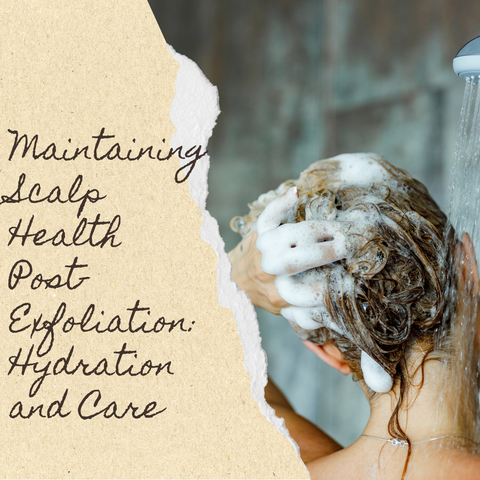
Maintaining scalp health after exfoliation entails proper hydration and ongoing care to ensure a balanced and nourished scalp environment. Here's how to maintain scalp health after exfoliation:
-
Hydrate the Scalp: Use hydrating treatments or masks designed specifically for the scalp. To keep your scalp moist, look for products that contain hyaluronic acid, aloe vera, or glycerin.
-
Use a moisturising shampoo and conditioner: Choose gentle, sulfate-free, and moisturising shampoos and conditioners. These help to cleanse the scalp without removing its natural oils, keeping it hydrated.
-
Limit Heat Styling: Excessive heat styling can cause scalp dryness. To avoid scalp dehydration, avoid using hot styling tools and instead opt for heatless styling methods.
-
Scalp Massage: Regularly massage your scalp using your fingertips to improve blood circulation and distribute natural oils, promoting a healthy scalp environment.
-
Protect from the Sun: When exposed to the sun, protect your scalp by wearing a hat or using SPF-containing hair products. Sun exposure can lead to scalp dryness and damage.
-
Balanced Diet and Hydration: Eat a balanced diet rich in vitamins, minerals, and essential fatty acids to support scalp health. Stay hydrated by drinking enough water, as dehydration can affect the scalp's condition.
-
Avoid Overwashing: While cleanliness is crucial, excessive washing can strip the scalp of its natural oils. Find a balance in your washing routine based on your scalp's needs.
-
Monitor Product Buildup: Regularly clarify your scalp to remove product buildup using a clarifying shampoo or treatment. This ensures that exfoliation remains effective by preventing new buildup.
-
Regular Scalp Check-ups: Pay attention to your scalp's condition and address any changes promptly. If you notice persistent issues or changes in your scalp health, seek advice from a dermatologist.
-
Follow Exfoliation Routine Accordingly: Stick to the recommended frequency of exfoliation for your scalp type and needs. Over-exfoliation can strip the scalp of its natural oils, leading to dryness or irritation.
The Role of Moisturization After Exfoliating Your Scalp
It is essential to moisturise your scalp after exfoliating it to maintain a healthy scalp environment, replenish hydration, and restore balance. Here's why moisturization is essential post-exfoliation:
-
Restore Moisture Balance: Exfoliating the scalp can help remove excess buildup and dead skin cells, but it can also deplete it of its natural oils. Moisturization helps replenish lost moisture, preventing dryness or dehydration.
-
Soothe Irritation: Exfoliation, even if gentle, can sometimes cause mild irritation or sensitivity. Applying moisturizing agents helps calm and soothe the scalp, reducing any potential discomfort.
-
Prevent Dryness: A dry scalp is prone to itchiness, flakiness, and even increased oil production as a compensatory response. By keeping the scalp moisturised, moisturization helps avoid dryness and the problems that follow.
-
Maintain Scalp Health: A hydrated scalp promotes a healthy scalp barrier, which is essential for protecting against external aggressors, infections, and overall scalp health.
-
Encourage Hair Growth: A moisturised scalp creates an ideal environment for hair follicles to thrive. Because dryness can harm hair health and growth, adequate hydration following exfoliation promotes healthy hair growth.
Remember that the key is to tailor your moisturization routine to the specific needs of your scalp. If you have a specific scalp condition or concern, consult a dermatologist or a hair care professional for personalised post-exfoliation moisturization recommendations.
Long-Term Scalp Health Strategies: Beyond Just Exfoliation
Exfoliation alone is not enough to maintain long-term scalp health; a comprehensive strategy incorporating multiple tactics targeted at fostering a healthy scalp environment is needed. Beyond exfoliation, try these long-term scalp health techniques:
-
Balanced Diet and Hydration: A nutritious diet high in vitamins, minerals, and essential fatty acids promotes overall scalp health. Drink plenty of water to stay hydrated, as dehydration can affect the condition of your scalp.
-
Gentle Hair Care Routine: Use gentle hair care products that are appropriate for your scalp type. Avoid harsh ingredients such as sulphates and high heat styling, which can deplete the scalp's natural oils and cause dryness or irritation.
-
Regular Cleansing: Maintain a regular cleansing routine to keep the scalp clean. Use a gentle shampoo that cleans effectively without over-drying or causing buildup.
-
Scalp Massage: Regularly massage your scalp to stimulate blood circulation, promote hair growth, and distribute natural oils. This can be done using fingertips or with a scalp massager.
-
Protection from Environmental Factors: Shield your scalp from environmental stressors like UV rays and pollution by wearing hats or using protective hair products containing SPF.
-
Stress Management: Chronic stress can have an impact on scalp health. Reduce stress levels and promote scalp health by using stress-relief techniques such as meditation, yoga, or other relaxation methods.
-
Frequent Trims: By affecting the general condition of your hair, regular hair trimming can help prevent split ends and breakage, which can indirectly affect the health of your scalp.
-
Steer clear of Tight Hairstyles: Hair follicle damage or traction alopecia may result from hairstyles that pull too tightly on the scalp.
-
Professional Guidance and Check-ups: Consult a dermatologist or a hair care professional if you have persistent scalp issues or notice changes in your scalp health. Regular check-ups can help address concerns before they worsen.
-
Tailored Care for Scalp Conditions: Adhere to a doctor's recommended course of action if you suffer from particular scalp conditions such as eczema, psoriasis, or dandruff. This could entail topical medications, medicated shampoos, or lifestyle adjustments.
-
Preventing Over-Exfoliation: Although exfoliation has its advantages, too much of it can upset the natural equilibrium of the scalp. Stick to the recommended frequency and listen to your scalp's response.
Never forget that taking care of your scalp properly is a continuous process that calls for patience, consistency, and awareness of its particular requirements. Consider your scalp type, any underlying conditions, and how your scalp reacts to various treatments and products when designing your scalp care regimen.
Personalized Scalp Care: Tailoring Exfoliation to Your Needs
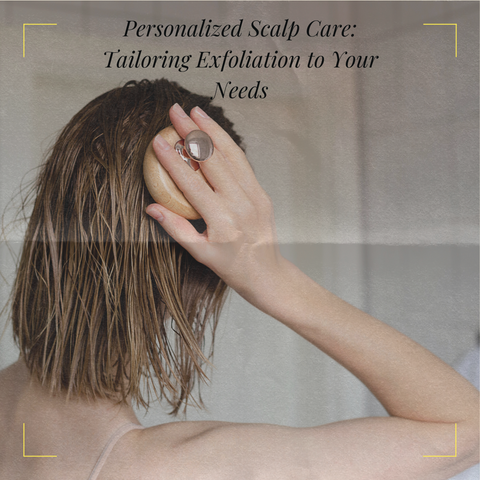
Taking into account your scalp type, concerns, and any current ailments is necessary to customise scalp exfoliation to your unique needs. Here are some tips for customising your scalp exfoliation routine: determine your scalp type, comprehend your concerns, select the appropriate exfoliants, decide how often to exfoliate, observe your scalp's reaction, patch test new products, combine exfoliation and nourishment, seek professional advice if necessary, and modify your regimen in response to seasonal variations. Customising your exfoliation regimen for your scalp entails learning what works best for its particular qualities and making necessary adjustments to your regimen. For the best possible scalp health, pay attention to your scalp's signals and modify your exfoliation routine accordingly.
Understanding Your Scalp Type: A Key to Effective Exfoliation
Knowing what type of scalp you have will help you choose the right exfoliation technique, frequency, and products to meet the unique requirements of your scalp. Below is a summary of the many types of scalps and how best to exfoliate them, including combo, oily, dry, sensitive, normal, and healthy scalps. The weather, ageing, changes in hormones, changes in lifestyle, and lifestyle changes can all cause changes in your scalp type over time. For optimum scalp health, then, periodically evaluate the state of your scalp and modify your exfoliation regimen accordingly.
Scalp Exfoliation Myths Debunked: What You Really Need to Know
The following common misconceptions about scalp exfoliation have been disproven to give you accurate knowledge about what is necessary for a successful exfoliation:
-
Myth: Daily exfoliation helps strengthen the scalp. Reality: Exfoliating the scalp every day can be excessive and can deplete the scalp's natural oils, causing dryness or irritation. The ideal frequency depends on the individual's scalp type and concerns. Excessive exfoliation can upset the scalp's balance and do more harm than good.
-
Myth: Physical scrubs are always the best way to exfoliate. Reality: Although physical scrubs can be helpful, some scalps—especially those that are sensitive—may find them to be excessively rough. Exfoliants that are based on enzymes or mild chemicals, such as salicylic acid, can effectively exfoliate the scalp without irritating it.
-
Myth: Shampoos with exfoliation are sufficient; no further care is required. Reality: Although they have their uses, exfoliating shampoos may not address every issue with the scalp. Maintaining the health and hydration of the scalp requires using extra treatments or moisturising after exfoliation.
-
Myth: Directly stimulating hair growth is possible with exfoliation. Reality: Exfoliation does not directly stimulate hair growth, but a healthy scalp environment can indirectly encourage healthier hair growth. It mainly concentrates on maintaining the health of the scalp, getting rid of buildup, and creating an atmosphere that encourages hair follicle growth.
-
Myth: Using harsh chemicals is a requirement for exfoliation. Reality: Exfoliation can be accomplished using a variety of methods, including gentle natural exfoliants such as oatmeal, sugar, or fruit enzymes. Effective exfoliants do not always contain harsh chemicals. Natural and milder options are available for sensitive scalps.
-
Myth: Exfoliation is equally important for everyone. Reality: Exfoliation isn’t a one-size-fits-all solution. Different scalp types and conditions require personalized approaches. Some scalps might benefit from regular exfoliation, while others may need it less frequently or using milder methods.
-
Myth: Scalp Exfoliation Can Cure All Scalp Issues. Reality: While exfoliation contributes to a healthier scalp, it may not be the sole solution for severe scalp conditions like psoriasis, eczema, or chronic dandruff. It's crucial to consult a dermatologist for proper diagnosis and treatment plans for such conditions.
Understanding these myths allows you to take a more informed and personalised approach to scalp exfoliation. It emphasises the importance of balancing exfoliation with proper care, tailored to individual scalp needs, and taking into account a variety of factors other than exfoliation alone for optimal scalp health.
Expert Insights: Dermatologist-Recommended Scalp Exfoliation Tips
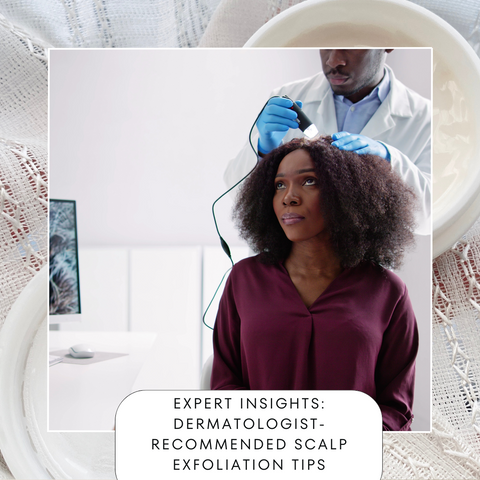
Dermatologists recommend the following steps for a healthy scalp after exfoliating your hair: understanding your scalp type; choosing the right exfoliants; paying attention to frequency; avoiding harsh scrubbing; thoroughly washing your hair; caring for your scalp afterwards; considering professional treatments; and speaking with an expert. While specific scalp conditions and sensitivities may vary, these recommendations are intended to serve as general guidelines. Consulting a dermatologist or hair care specialist can provide tailored advice about your scalp's unique needs for effective and safe exfoliation.
















